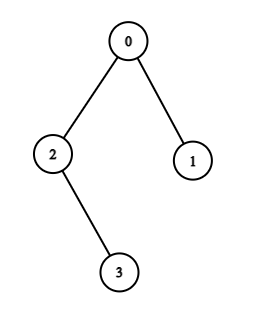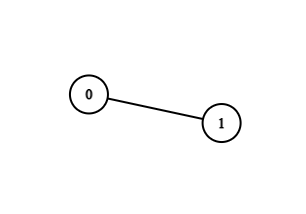| Codeforces Round 721 (Div. 2) |
|---|
| Finished |
You are given a tree with $$$n$$$ nodes, numerated from $$$0$$$ to $$$n-1$$$. For each $$$k$$$ between $$$0$$$ and $$$n$$$, inclusive, you have to count the number of unordered pairs $$$(u,v)$$$, $$$u \neq v$$$, such that the MEX of all the node labels in the shortest path from $$$u$$$ to $$$v$$$ (including end points) is $$$k$$$.
The MEX of a sequence of integers is the smallest non-negative integer that does not belong to the sequence.
The first line contains a single integer $$$t$$$ ($$$1 \le t \le 10^4$$$) — the number of test cases.
The first line of each test case contains a single integer $$$n$$$ ($$$2 \le n \le 2 \cdot 10^{5}$$$).
The next $$$n-1$$$ lines of each test case describe the tree that has to be constructed. These lines contain two integers $$$u$$$ and $$$v$$$ ($$$0 \le u,v \le n-1$$$) denoting an edge between $$$u$$$ and $$$v$$$ ($$$u \neq v$$$).
It is guaranteed that the given edges form a tree.
It is also guaranteed that the sum of $$$n$$$ for all test cases does not exceed $$$2 \cdot 10^{5}$$$.
For each test case, print $$$n+1$$$ integers: the number of paths in the tree, such that the MEX of all the node labels in that path is $$$k$$$ for each $$$k$$$ from $$$0$$$ to $$$n$$$.
2 4 0 1 0 2 2 3 2 1 0
1 2 1 1 1 0 0 1
- In example case $$$1$$$,

- For $$$k = 0$$$, there is $$$1$$$ path that is from $$$2$$$ to $$$3$$$ as $$$MEX([2, 3]) = 0$$$.
- For $$$k = 1$$$, there are $$$2$$$ paths that is from $$$0$$$ to $$$2$$$ as $$$MEX([0, 2]) = 1$$$ and $$$0$$$ to $$$3$$$ as $$$MEX([0, 2, 3]) = 1$$$.
- For $$$k = 2$$$, there is $$$1$$$ path that is from $$$0$$$ to $$$1$$$ as $$$MEX([0, 1]) = 2$$$.
- For $$$k = 3$$$, there is $$$1$$$ path that is from $$$1$$$ to $$$2$$$ as $$$MEX([1, 0, 2]) = 3$$$
- For $$$k = 4$$$, there is $$$1$$$ path that is from $$$1$$$ to $$$3$$$ as $$$MEX([1, 0, 2, 3]) = 4$$$.
- In example case $$$2$$$,

- For $$$k = 0$$$, there are no such paths.
- For $$$k = 1$$$, there are no such paths.
- For $$$k = 2$$$, there is $$$1$$$ path that is from $$$0$$$ to $$$1$$$ as $$$MEX([0, 1]) = 2$$$.
| Name |
|---|




